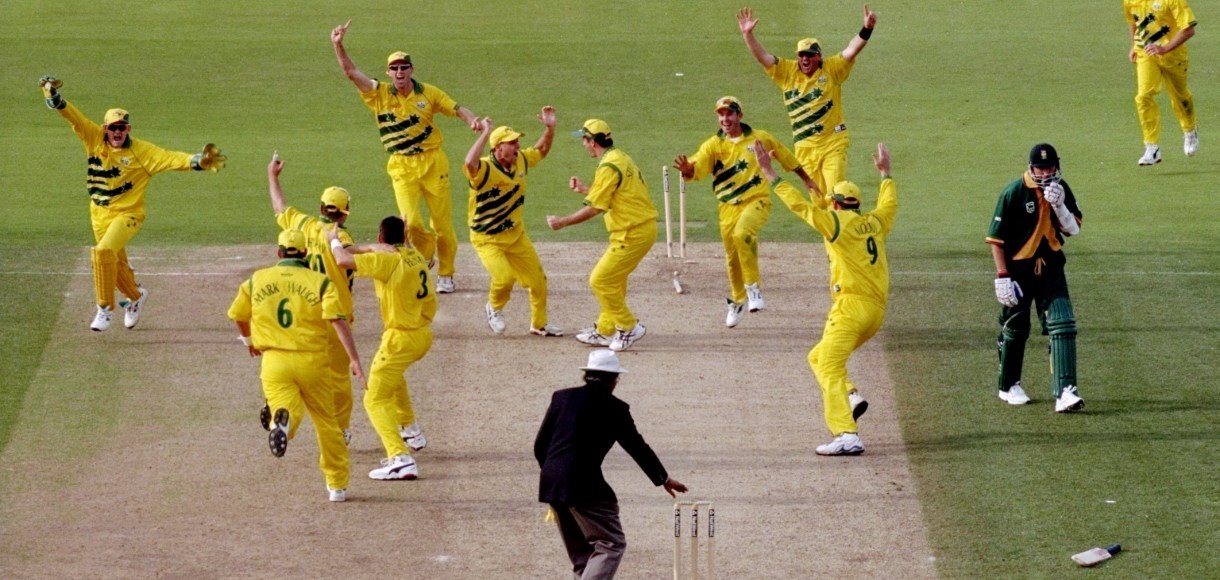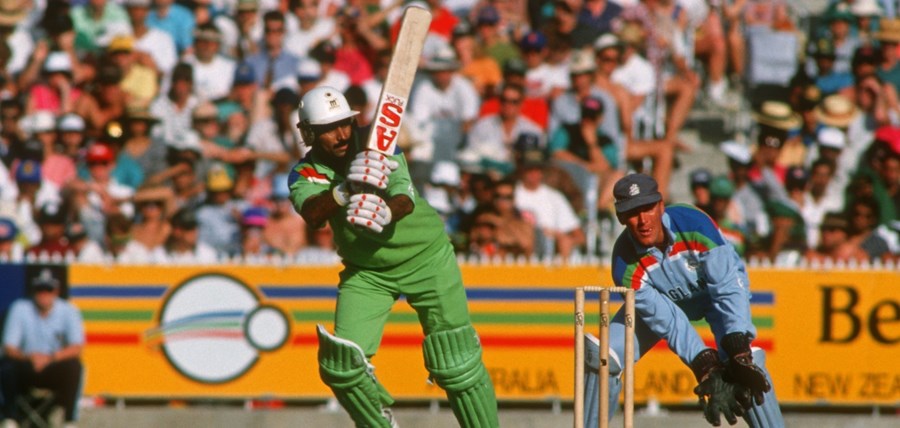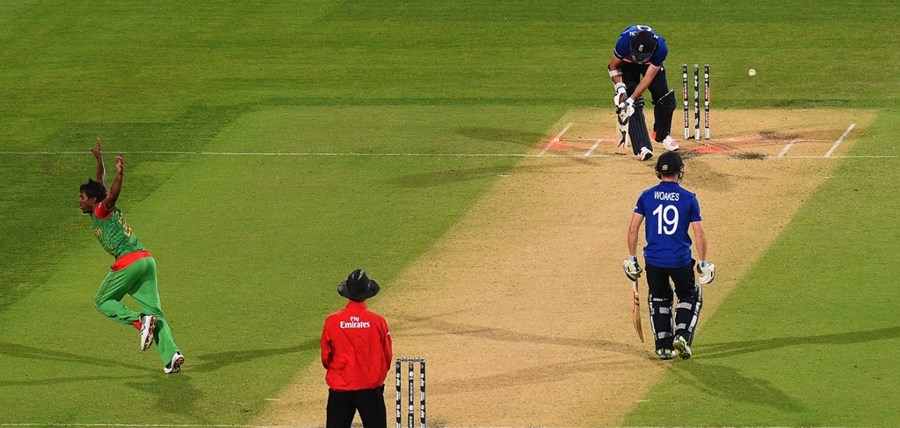6 iconic moments that changed Cricket World Cup history

From last-gasp run outs to comical dropped catches, the Cricket World Cup is never short of drama. Here are six moments that changed the history of the tournament.
Gibbs shells the trophy | Australia v South Africa | Edgbaston | Super Six (1999)
“You’ve just dropped the World Cup.”
Those famous words – apparently uttered by Australia captain Steve Waugh after Herschelle Gibbs dropped a simple chance to send him on his way – could not have been more accurate.
Waugh, who was on 56 at the time, went on to compile a wonderful 120* to send the Aussies through to the semi-finals – and we all know what happened next (see below if you don’t).
Gibbs, for all his talent – he scored more than 8,000 ODI runs and 6,000 Test runs in his career – will unfortunately always be remembered for this drop first and foremost.
The explosive batsman was never short of self-confidence and, had he not attempted to throw the ball up in celebration, would easily have held on and likely dumped the Aussies out in the process.
Klusener’s call | Australia v South Africa | Headingley | Semi-final (1999)
Scores level. Three balls to go. One wicket remaining. South Africa are on the verge of their first World Cup final appearance, just four days after Gibbs’ drop.
Their hopes rest on an in-form Lance Klusener, who has bludgeoned 31 from 16 balls to put them on the cusp of victory over Australia.
At the other end is their No.11, Allan Donald, who had narrowly avoided being run out the previous ball.
Off the fourth ball of the over, Klusener mishits a drive to mid-off and calls for a run, but Donald doesn’t respond in time and this time he is caught out of his ground.
Australia are through thanks to their superior run rate and go on to win the tournament, retaining their title in 2003 and 2007 and adding another 2015.
A bit more patience from Klusener, swifter feet from Donald (or safer hands from Gibbs) and Australia’s hegemony never begins – potentially opening the door for South Africa to become the 21st century’s dominant team instead.
Duckworth-Lewis cock-up | South Africa v Sri Lanka | Group stage (2003)
There’s a theme emerging here.
Just four years after passing up two opportunities to knock Australia out of the 1999 World Cup, South Africa produced another classic bottle job.
Duckworth-Lewis had been used in international cricket for the previous four years by the time the rain poured down during the Proteas’ pursuit of 269 against Sri Lanka in the 2003 group stage, so there can be no excuse for what followed.
With five overs and one ball remaining, and the umpires ready to take the players off at the end of the over, the message was passed on to batsman Mark Boucher that his side’s current total – 229/6 – would be enough to win the game on the D/L method and progress to the next stage, as long as no wicket fell from the last ball.
Boucher blocked the delivery and escaped the downpour, pumping his fist at the presumably-jubilant balcony, only to see captain Shaun Pollock sitting with his head in his hands.
The message had been wrong, and, with a tie inadequate, South Africa were out of their home tournament at the first hurdle.
Pollock diplomatically refused to reveal the cause of the confusion afterwards, but the image of him sitting alone and staring at the rainfall long after the game had been abandoned certainly suggests a head full of regrets.
Gatting’s reverse sweep | Australia v England | Eden Gardens | Final (1987)
England are perennial World Cup runners-up having lost three finals – more than any other side.
They have never come closer to the trophy than in 1987, when Australia scraped home by seven runs – the closest winning margin in the tournament’s history.
England, led by Mike Gatting, required 254 to win and were cruising at 135/2 after 32 overs when the skipper had a major brain fart.
Facing up to part-time spinner Allan Border, Gatting – normally a risk-averse batsman – attempted a reverse sweep and was caught behind for 44 from 41 balls.
Allan Lamb did his best to carry England’s innings through, but they fell just short, with their best chance at the title (so far) narrowly eluding them.
Rain saves Pakistan | Pakistan v England | Adelaide Oval | Group stage (1992)

As a sport, cricket does not handle change particularly well.
However, one advancement that has been both welcome and necessary is the introduction of the aforementioned Duckworth-Lewis method, or DLS as it is now known, for rain-affected matches.
Before the advent of DLS, cricket suffered from a series of nonsensical rain rules that left everyone scratching their heads.
The 1992 World Cup was particularly affected, most notably during the group-stage clash between England and eventual winners Pakistan.
Pakistan had been bowled out for a paltry 74 after England’s dangerous pace attack had ripped through their batting order.
England reached 24/1 after eight rain-affected overs before the match was called off, a total which would have handed them a clear victory under DLS.
The points were shared however, with the draw putting Pakistan through at the expense of Australia.
England were beneficiaries of a similar farce in the semi-finals, with South Africa suddenly requiring 21 from one ball rather than the 22 off 13 they needed before rain came.
Should Duckworth-Lewis have been in place at that time, who knows which team would have won the tournament? Not Pakistan, that’s for sure.
Bangladesh shock the world | England v Bangladesh | Adelaide Oval | Group stage - 2015

England have hit depths few other top teams could imagine over the course of World Cup history, with their 2011 defeat to Ireland particularly painful, so it says something that the 2015 group-stage exit to Bangladesh was a new low.
Captain Eoin Morgan had been dismissed for a fifth duck in nine innings to put his international career in jeopardy, while several other old hands had also fallen short of expectations.
The inquest which followed saw the ECB overhaul the country’s approach to limited-overs cricket, with several Test stalwarts dropped in place of a young, hungry and fearless group of players.
Since that nadir in South Australia, England have risen the ODI rankings to take top spot and start the 2019 edition as favourites to lift the trophy on home soil.
England fans will have horrible memories of that day in 2015, but could it be the latest moment to change World Cup history?
Visit Betway's cricket betting page.





































